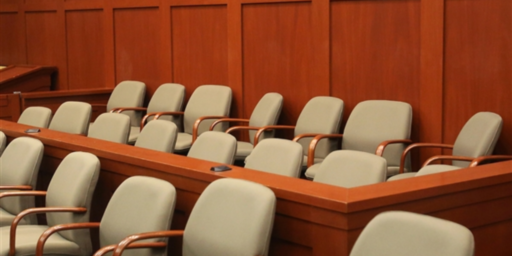Libby Trial: Are His Peers This Stupid?
David Shuster describes the voir dire process for the Libby trial:
This is day #2 of jury selection, and it has become another bad day for a few of America’s elite universities. This morning, a young woman with degrees from Swarthmore and Emory University said she had no opinion about the Bush Administration’s case for war with Iraq. She also said she never watches the news or reads the paper, and said she would consider Vice President Cheney “a perfect stranger.” Yesterday, a potential juror with two degrees from Northwestern, including one in journalism, said she thought she knew something about the CIA leak case but “couldn’t recall anything.” When asked about the types of stories she covered as a graduate school journalist, that woman repeatedly said, “I don’t really remember…just stuff at the court, stuff at the city council.” Asked what else? She said, “Other stuff.” Asked to be more specific, she said “I don’t remember. It was a bunch of stuff.” This exchange prompted endless teasing of one of my journalism colleagues covering the trial who is a Northwestern graduate. “Stuff happens,” noted one of the other reporters here.
I’m not sure which is scarier, the idea that Ivy League J-school grads living in DC are this clueless or that people might be feigning ignorance to get on the jury of a high profile case.
Still, as Steve Benen points out, “In a city in which Republicans are outnumbered 9 to 1, finding DC residents who can be objective about Dick Cheney’s right-hand man is apparently pretty difficult.”
Of course, the jury system was never supposed to ensure that twelve idiots were selected, merely that those seated are “free of bias, have no specific knowledge of the case, and have no connection with any of the parties or witnesses.” It’s not quite clear that even that’s happening, though, as acquaintances of the witnesses, attorneys, and even Libby are making it past the first round.
Carol Leonnig and Amy Goldstein are right: it’s an indication of “how small a town Washington really is.” They observe that, “It has always been difficult to select juries in Washington, where the pool is small compared with the number of trials, and half the people summoned to be jurors don’t even show up. But the star power of the players in this case has complicated matter.”
The voir dire and peremptory challenges may well solve the problem by the time the pool is whittled to twelve jurors and four alternates. Bob Cox lists some of the questions being asked of prospective jurors by the Libby team and they are quite shrewd indeed. If they are answered honestly, their man will get a fair jury. Indeed, as Bob muses, it’s not inconceivable “that after all this hoopla and build up, Libby’s lawyers don’t put up a defense at all?”





I’m not sure which is scarier, the idea that Ivy League J-school grads living in DC are this clueless or that people might be feigning ignorance to get on the jury of a high profile case.
I suspect it is a bit more of the second than the first, but if it is the first, I can rest assured that we don’t have to save enough money to send our kids to an Ivy League school, given that the students are apparantly not expected to learn anything more than how to say and spell the word “stuff.”